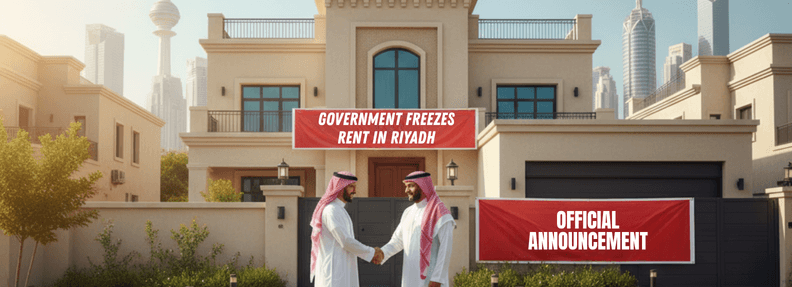
Riyadh rent freeze: Will growth stop or accelerate?
The freeze isn't about stopping growth—it's about creating balance in the residential and commercial rental market while strengthening fairness and transparency (1). This creates conditions for long-term investment rather than speculative bubbles.
Table of contents
- Understanding the 5-year rent stabilization
- SAR 1.2 trillion proves market strength
- Why stable rents actually boost real estate
- PropTech innovation creates new careers
- Riyadh's transformation continues full speed
Understanding the 5-year rent stabilization
The regulations are carefully designed to protect all parties. Landlords cannot increase rental values on existing or new contracts during this period (1), while tenants gain automatic renewal rights unless either party provides 60 days notice (1). Properties not previously leased can still negotiate market rates between landlord and tenant.
All lease contracts must now be registered on the "Ejar" network (1), bringing transparency to the market. Violations carry fines of up to 12 months' rent (1), ensuring compliance. These measures represent a pivotal step toward providing a fair and secure investment environment that supports sustainable urban development (1).
SAR 1.2 trillion proves market strength
The numbers demonstrate Riyadh's real estate sector remains robust. From July 2023 to July 2025, the market recorded approximately SAR 1.2 trillion in total transaction value from more than 8 million real estate deals (2). Over 86,000 individuals are now licensed to practice real estate brokerage (2), while 75 digital real estate platforms feature over 685,000 approved listings (2).
Beyond Riyadh, the ministry of municipalities and housing is leading more than 11,000 development projects across over 300 municipalities throughout the Kingdom (3). Homeownership rates rose from 47% before Vision 2030 to over 60% today, targeting 70% by 2030(3). The national housing company signed agreements totaling nearly SAR 30 billion (4), showing continued investment flows.
Why stable rents actually boost real estate
The rent freeze creates several positive effects. When rental costs stabilize, tenants can save more money toward purchasing their own properties, increasing demand for home ownership. This aligns perfectly with the Kingdom's goal of reaching 70% homeownership by 2030.
Stable rental prices attract serious long-term investors who value predictable returns over speculative gains. Market regulation prevents price bubbles and the subsequent crashes that devastate investors. The measures enhance quality of life and support efforts for sustainable urban development (1), making Riyadh more attractive to both residents and businesses.
PropTech innovation creates new careers
Technology continues reshaping Saudi real estate. The Real Estate General Authority will host the Global PropTech Summit 2025 in Riyadh this October (5), bringing together international experts to discuss AI's evolving role in real estate, digital asset ownership, and PropTech solutions for smart decision-making (5).
A memorandum of understanding between the national housing company, King Abdulaziz City for Science and Technology, and Al Saif Company advances off-site construction technologies (4). The growth of digital platforms creates demand for PropTech specialists, AI analysts, platform managers, and data scientists who can drive smart real estate decisions.
Traditional careers remain strong—licensed brokers, property managers, compliance officers—while new technology-enabled roles emerge in construction innovation and automated property management.
Riyadh's transformation continues full speed
The rent freeze is one component of comprehensive urban transformation, not a barrier to it. The combination of regulatory stability, technological innovation, and massive infrastructure investment positions Riyadh as a leading real estate hub.
For professionals, this represents an opportunity window. Those who develop expertise in PropTech, regulatory compliance, or sustainable development will find themselves in high demand as the market matures. The next five years won't see growth halt—they'll see growth become smarter, more sustainable, and more technology-driven than ever before.



